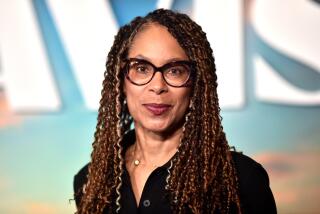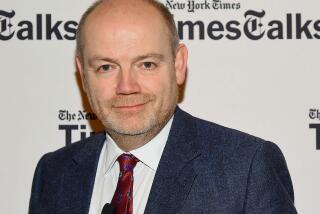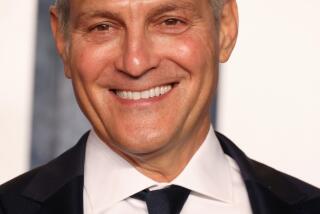Kevin Tsujihara is named CEO of Warner Bros.
In a bold bet on the digital future of entertainment, Time Warner Inc. has named Kevin Tsujihara as chief executive of its Warner Bros. studio — ending a fiercely fought battle for one of the most powerful jobs in Hollywood.
Tsujihara has been president of Warner Bros.’ home entertainment unit, which is responsible for home video, online distribution and video games. In winning the top spot, he edged out rivals overseeing the larger and more prestigious film and television divisions. He will become the first Asian American to run a major Hollywood studio.
When he becomes CEO on March 1, Tsujihara’s priority will be determining how the company can continue to profit from feature films and TV shows as people increasingly watch their entertainment on tablets, game consoles and even smartphones.
PHOTOS: Billion-dollar films | All-time box office leaders
He also must calm a company that has been roiled by a tumultuous two-year corporate runoff between Tsujihara and two other ranking executives who wanted the job.
“Change can be unnerving, change can be disconcerting,” Tsujihara, 48, said in an interview. “The utmost important thing is to safeguard what is most important and cherished here at Warner Bros.: our management team and our relationships with creative talent.”
Tsujihara, the grandson of Japanese immigrants and the son of a Northern California egg farmer, will become only the fifth leader in the 90-year history of Warner Bros., home of Bugs Bunny, Batman and “The Big Bang Theory.”
The famously stable studio has been gripped by tension for two years, since senior managers set up a power-sharing arrangement to groom a successor to current chairman Barry Meyer, who plans to retire in December after 14 years at the helm.
The coalition government, made up of the three executives vying for the CEO position at Hollywood’s largest studio, was intended to foster cooperation. But infighting ensued as Tsujihara and the heads of the company’s film and TV divisions maneuvered for the coveted job.
Tsujihara’s humble and low-key management style ultimately trumped the more aggressive personalities of Bruce Rosenblum, president of the television group, and Jeff Robinov, the film studio chief.
“Everyone needs a leader, and Kevin was the person best equipped to unify the company at this time,” Meyer said in an interview. “We just thought he was the best choice for the whole company.”
Tsujihara, who will gain the chairman title when Meyer steps down, does not have experience running the company’s marquee movie and television businesses. In fact, the USC graduate had launched a tax preparation website before joining Warner Bros. in 1994.
His ascension is notable not only because of the lack of racial diversity in Hollywood’s corporate suites but also because studio chiefs in the past have come from the worlds of television, marketing and film distribution — but never the newer business of home entertainment. Tsujihara worked in business development and online content before taking his current post as head of home entertainment and digital distribution in 2005.
But the Stanford MBA’s knowledge of the digital landscape was only one reason he won the job.
“It was about the person and the character of the person,” Meyer said. “The digital transition is one that is happening and it is affecting every part of our company. Kevin has really been at the forefront of that, and leading that charge, but Warner Bros. is really about the products that it makes.”
The studio is responsible for the “Dark Knight” and “Harry Potter” film franchises, critically acclaimed movies such as the Oscar favorite “Argo,” and profitable television shows such as “The Big Bang Theory” and “Two and a Half Men.” Warner Bros. is regularly No. 1 or No. 2 in the annual box-office ranking, has the top market share in home video and sells more TV shows to networks than any other studio. Revenue in 2011 climbed 9% to $12.6 billion.
Warner Bros. is widely viewed as one of the most progressive studios in testing new digital businesses, earning Tsujihara his share of allies and critics.
Under his leadership, Warner Bros. became the first studio to adopt UltraViolet, a “digital locker” service that enables consumers who buy movies to access them on any Internet-connected device. But the technology prompted initial negative reviews in the tech community. Tsujihara also oversaw many of the company’s early efforts to produce content tailored for the Internet, most of which fizzed as the dot-com bubble burst.
Supporters credit Tsujihara as one of executives in Hollywood most willing to embrace risk. He also championed the studio’s acquisition of film fan website Flixster as well as making the studio’s content available on a variety of platforms, including iTunes and Xbox.
Despite early misgivings by some in his company, Tsujihara championed the migration of content to the Internet and mobile devices. He helped negotiate a series of lucrative deals with the film and TV delivery service Netflix.
“Kevin has been managing the very delicate life cycles of new media and old revenue models and this move is in recognition of that success,” said Ted Sarandos, Netflix’s chief content officer.
Tsujihara was also deeply involved in the complex negotiations that breathed life into “The Hobbit” when it was caught in a web of seemingly intractable problems, including the bankruptcy of co-rights owner Metro-Goldwyn-Mayer. Then came an awkward switch in movie directors from Guillermo del Toro to Peter Jackson, and labor problems in New Zealand, where the feature was shot.
“Kevin is a brilliant executive and great partner who was critical in working with the prime minister of New Zealand, Peter Jackson and MGM to make ‘The Hobbit’ happen,” said Gary Barber, MGM’s chief executive.
The first of three planned “Hobbit” movies was released by Warner in December and has grossed more than $900 million worldwide.
The two other candidates offered their support in separate statements.
Rosenblum was long seen by studio insiders as the favorite to win the job. Warner Bros. had a tradition of promoting television executives to the chairman job and Rosenblum was Meyer’s longtime deputy. He is expected to stay with the company at least until August, when his current contract ends.
“Obviously, I’m disappointed; who wouldn’t be?” Rosenblum said. “Warner Bros. is a unique and special place and it will be in good hands with Kevin at the helm.”
“I am truly happy and proud of Kevin,” Robinov said. “The company will be in great shape under his leadership.”
The historic Burbank company, founded in 1923 by brothers Jack, Harry, Sam and Albert Warner, has traditionally been one of the industry’s most stable. It’s that genteel culture that Jeff Bewkes, CEO of parent company Time Warner, and Meyer sought to preserve.
“The Warner Bros. culture is one of respect,” said Bob Daly, who was chairman of the studio from 1980 until 1999. “That quality was instilled in all of us — always be respectful of each other and listen to people.”
Tsujihara, according to some outside the company, comes from that tradition.
“He hasn’t been polarizing in his job. People like him,” said Patrick Whitesell, co-chief executive of William Morris Endeavor talent agency.
One of the knocks against Tsujihara is his lack of hands-on experience in film and television production. But Whitesell said that is not a liability.
“Warner’s has great depth on the movie side and similarly so in television,” Whitesell said. “So, he’s got great people there and just has to keep letting them do their jobs.”
Ron Meyer, the longtime head of rival Universal Studios, agreed.
“Kevin is a superb businessman and certainly at the forefront of new technology for the industry, but nobody comes into one of these jobs knowing everything that you need to,” he said. “We all go through a learning curve.”
-------------------------------
Kevin Tsujihara
Age: 48
New job: Chief executive, Warner Bros. Entertainment
Career: Founded an online tax filing company before joining Warner in 1994; chief executive of Warner Bros. Home Entertainment since 2005
Education: Bachelor’s in business administration from USC; MBA from Stanford
Family: Married with two children
Personal: The Petaluma, Calif., native is an avid sports fan and a supporter of the San Francisco Giants
MORE
INTERACTIVE: TVs highest paid stars
INTERACTIVE: YouTube’s viral videos of 2012
PHOTOS: Hollywood back lot moments
More to Read
From the Oscars to the Emmys.
Get the Envelope newsletter for exclusive awards season coverage, behind-the-scenes stories from the Envelope podcast and columnist Glenn Whipp’s must-read analysis.
You may occasionally receive promotional content from the Los Angeles Times.







